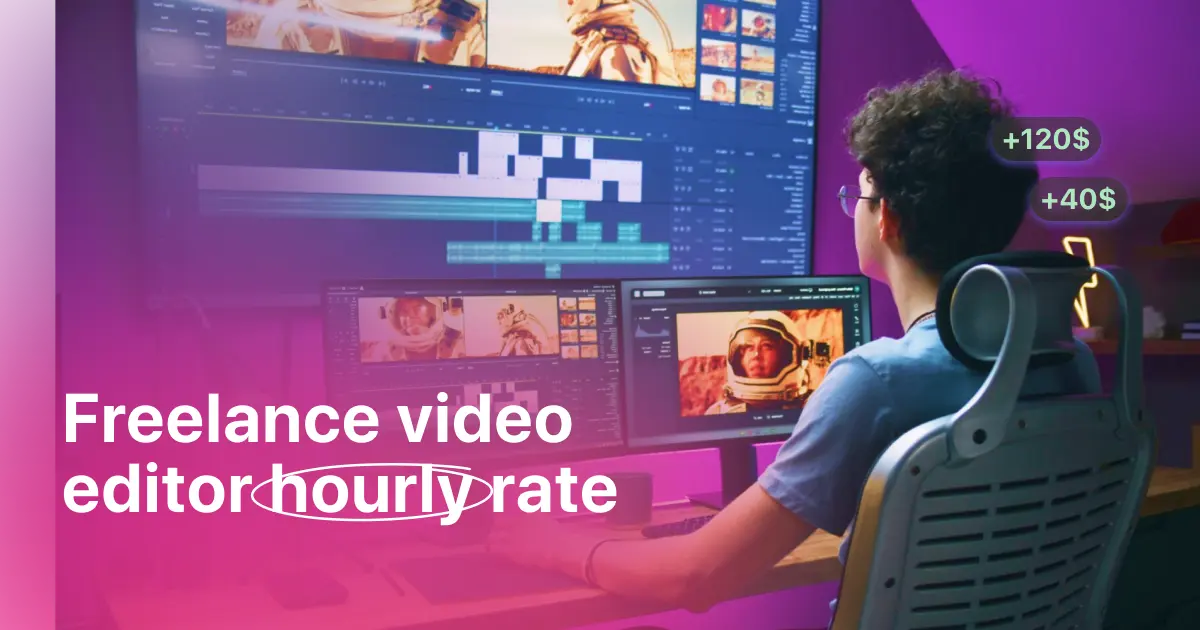Plans built for businesses
Pro + AI
For pro video creation
Advanced + AI
For users who want to generate video ads
*Billed yearly
Compare plans
Freelance Video Editor Contract Types and Templates
20 June, 2024
Freelancing as a video editor offers tremendous flexibility and the opportunity to work on a variety of projects. However, the key to a successful freelance career lies in having robust contracts in place. Contracts not only provide legal protection but also set clear expectations for both the freelancer and the client.
This comprehensive guide explores the importance of contracts in freelance work, the different types of freelance video editing contracts, and provides templates for each type to help you get started.
Importance of Contracts in Freelance Work
Contracts are fundamental in freelance work for several reasons:
-
Legal Protection: Contracts provide a legal safety net for both parties involved. They outline the obligations and rights of the freelancer and the client, offering a clear path for resolution if disputes arise. Without a contract, freelancers risk not being paid for their work, and clients risk receiving subpar work or delays.
-
Clear Scope of Work: A detailed contract specifies the exact tasks and deliverables expected from the freelancer. This prevents misunderstandings and scope creep—where clients might request additional work not covered by the original agreement. By defining the scope clearly, both parties understand what is included and what is not, leading to smoother project execution.
-
Payment Terms: Contracts clarify how and when payments will be made. They can specify the total fee, payment schedule, method of payment, and penalties for late payments. This ensures that freelancers are compensated fairly and on time, and clients understand their financial commitments.
-
Deadlines: Setting clear deadlines in a contract ensures that both parties are aware of the timeline for project completion. This helps manage expectations and provides a structured timeline for project milestones, which is crucial for planning and productivity.
-
Professionalism: Using a contract demonstrates professionalism and commitment. It shows that the freelancer is serious about their business and is committed to delivering high-quality work. Clients are more likely to trust and respect freelancers who operate with professional standards.
Types of Freelance Video Editing Contracts
Freelance video editors can use several types of contracts, each suited to different kinds of projects and client relationships. Understanding these contract types can help freelancers choose the right one for each job.
Project-Based Contracts
Project-based contracts are agreements where the freelancer is hired to complete a specific project. The contract outlines the project’s scope, deadlines, and payment terms. This type of contract is ideal for one-time projects with a well-defined beginning and end.
Benefits:
-
Clear Deliverables: The project’s deliverables are clearly defined, reducing the risk of misunderstandings.
-
Fixed Payment: The total payment is agreed upon upfront, providing financial predictability for both parties.
-
Defined Timeline: Deadlines are set, ensuring that the project progresses in a timely manner.
Drawbacks:
-
Limited Flexibility: Renegotiation may be necessary if the project scope changes significantly.
-
All-or-nothing: Payment is typically tied to project completion, which can be a risk if disputes arise.
Retainer Contracts
Retainer contracts involve a client retaining a freelancer’s services for a set period, often on a monthly basis. The freelancer is paid a consistent fee to be available for a certain number of hours or tasks each month.
This type of contract benefits clients who need ongoing work and freelancers who prefer stable, predictable income.
Benefits:
-
Stable Income: Freelancers receive a steady income, which can be more predictable than project-based work.
-
Ongoing Relationship: Retainer contracts foster long-term client relationships, which can lead to more consistent work and easier collaboration.
-
Flexibility: Clients have regular access to the freelancer’s services without needing to negotiate new terms for each project.
Drawbacks:
-
Time Commitment: Freelancers must be available as needed, which can limit their ability to take on other projects.
-
Scope Ambiguity: Without clear definitions, the scope of work can become ambiguous, potentially leading to disputes.
Hourly Contracts
Hourly contracts are straightforward agreements where the freelancer is paid based on the number of hours worked. These contracts are flexible and can be adjusted according to the needs of the project. They are particularly useful for projects where the scope is not clearly defined, and the amount of work can vary.
Benefits:
-
Flexibility: Freelancers can adapt to changes in project scope without needing to renegotiate the contract.
-
Accurate Compensation: Freelancers are paid for the exact amount of work they do, which can be fairer for ongoing or evolving projects.
-
Simple Tracking: Time-tracking tools can easily monitor the hours worked, providing transparency for both parties.
Drawbacks:
-
Unpredictable Income: Income can vary based on the hours worked, which may be less predictable than fixed contracts.
-
Client Concerns: Some clients may be wary of hourly billing, fearing that hours could be inflated.
Milestone-Based Contracts
Milestone-based contracts break a project into several phases, with payments tied to the completion of each phase. This type of contract helps manage large projects by ensuring that the freelancer gets paid for their work as they complete key stages of the project.
Benefits:
-
Structured Progress: Breaking the project into milestones provides clear checkpoints and progress tracking.
-
Regular Payments: Freelancers receive payments at regular intervals, improving cash flow.
-
Reduced Risk: Both parties can evaluate the project’s progress at each milestone, reducing the risk of total project failure.
Drawbacks:
-
Complexity: Managing multiple milestones can be more complex than a single project deadline.
-
Negotiation: Each milestone may require renegotiation if the project scope changes.
Freelance Video Editor Contract Templates
Having access to the right contract templates is crucial for freelance video editors. These templates serve as a starting point and can be customized to suit your specific needs and the particulars of each project.
-
Project-Based Contract Template: Project-Based Contract
-
Retainer Contract Template: Retainer Contract
-
Hourly Contract Template: Hourly Contract
-
Milestone-Based Contract Template: Milestone Contract
Conclusion
Contracts are an indispensable part of freelancing, providing a clear framework for both freelancers and clients. Whether you are working on a project-based, retainer, hourly, or milestone-based contract, having a well-drafted agreement in place helps ensure that both parties understand their obligations and protects their interests.
By understanding the different types of contracts and utilizing the right templates, you can enhance your professional practice, build trust with your clients, and ensure a smoother workflow, leading to successful and rewarding freelance engagements.










